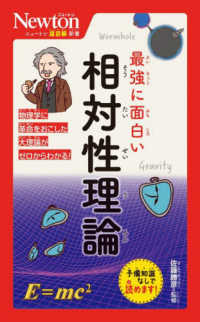- ホーム
- > 洋書
- > ドイツ書
- > Humanities, Arts & Music
- > Psychology
- > general surveys & lexicons
Full Description
This book consists of a focused and systematic analysis of Freud's implicit argument for unconscious mental states. The author employs the unique approach of applying contemporary philosophical methods, especially Kripke-Putnam essentialism, in analyzing Freud's argument. The book elaborates how Freud transformed the intentionality theory of his Cartesian teacher Franz Brentano into what is essentially a sophisticated modern view of the mind. Indeed, Freud redirected Brentano's analysis of consciousness as intentionality into a view of consciousness-independent intentionalism about the mental that in effect set the agenda for latter-twentieth-century philosophy of mind.
Contents
1. Introduction: Freud and the Transformation of Psychology.- 2. "Unconscious" as "Mental but Not Conscious": Why Examples of Repression, the Dynamic Unconscious, and Psychopathology Are Largely Irrelevant to Freud's Philosophy-of-Mind Argument.- 3. The Semantic Objection to Freud's Thesis.- 4. Freud's Response to the Semantic Objection: Concepts, Essentialism, and the Definition of 'Mental'.- 5. Freud and Brentano: The Cartesian Tradition that Confronted Freud.- 6. Cartesianism Without the Consciousness Criterion: Solving the Mystery of Freud's Missing Account of the Mental.- 7. Freud's Direct Arguments Against the Consciousness Criterion: Does Freud Beg the Question of the Boundary of Psychology?.- 8: Freud on the Mind-Body Problem: Turning Psychophysical Parallelism on Its Head.- 9. Freud's Argument for Brain Representationality as the Essence of the Mental.- 10. Conclusion: The Freudian Century in Philosophy of Mind.








